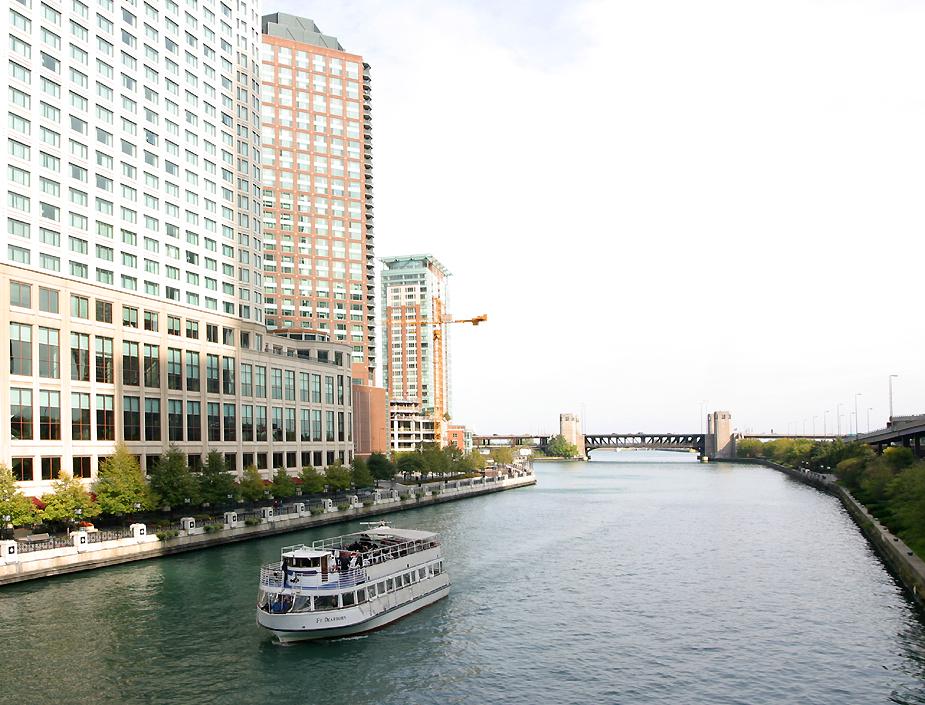CSO’s monthlong Rivers festival to start rolling this week

Spring music festivals can be invigorating, especially in a city like Chicago where winters seem to last forever. In recent years the Chicago Symphony Orchestra has closed out its seasons with festivals focusing on composers (Dvorak in 2009, Beethoven in 2010) and the piano (2012).
This year’s festival, “Rivers: Nature. Power. Culture,” is exploring a broader topic. Running Thursday through June 9 it will include orchestral performances, chamber concerts and a world premiere by jazz trumpeter Orbert Davis and his Chicago Jazz Philharmonic.
There will be a Chicago River Clean-Up Day May 11 and a symposium May 18 at Symphony Center. The festival will close June 9 with CSO brass and wind musicians playing while they float down the Chicago River by boat to Ping Tom Park in Chinatown. Once there, CSO music director Riccardo Muti will lead several local choruses in “Va, pensiero” from Verdi’s Aida and help christen a new City of Chicago boat dock.
“We’ve been moving toward this festival-like schedule in the spring of every season,” said Martha Gilmer, the CSO’s vice president of artistic administration. “Riccardo Muti has a great passion for the environment, so this was a natural result of that. Yo-Yo [Ma, the CSO’s creative consultant] built on that idea and talked about it early on.”
The festival includes such works as Smetana’s The Moldau, Wagner’s Siegfried’s Rhine Journey and Mississippi River, a symphony by African-American composer Florence Price written in 1934. Born in Arkansas, she moved to Chicago in 1927 and blossomed as a composer here. But as plans developed, the festival’s focus moved far beyond merely programming pieces that evoked specific images of rivers or nature.
“You don’t have to dig far to realize that composers have always been inspired and affected by rivers,” said Gilmer. “For instance, you read some of the writings of Maurice Ravel when he was composing Bolero. We have many ideas as to where that piece came from. But, in fact, he was on the Rhine River and seeing these immense factories. He thought of this mechanical factor alongside the base of this flowing river, and that’s partly where he took inspiration.
“The tagline of ‘Nature. Power. Culture’ is an important key to understanding how we enter this idea of a rivers festival,” she said. “Power is the power of rivers to overflow their banks and completely upset the lives those living alongside. But it’s also the power that we as people have exerted on the rivers. Rivers divide. Rivers connect.’’
Of course the festival includes several nods to the Chicago River, which flows a few blocks north and west of Symphony Center. Compared with glamorous Lake Michigan, the hard-working Chicago River has long played the part of dowdy—if not downright ugly—little sister. The river may have had its proverbial fifteen minutes of fame in 1900 when engineers reversed its flow to stop polluted river water from flowing into Lake Michigan. But beyond serving as an industrial highway, the Chicago River has typically played second fiddle to the more majestic Lake Michigan.
In recent years that situation has begun to change. Now relatively clean, with miles of walking paths being developed downtown and elsewhere along tree-lined banks, the Chicago River is having another moment in the spotlight.
James M. Fahey, director of artistic administration at the CSO who also programs Symphony Center’s jazz concerts, pushed to include a focus on the Chicago River. Last fall Symphony Center presented The Great Flood, a work by guitarist and composer Bill Frisell about the Mississippi River flood of 1927 that included images and staging by Bill Morrison.
“I kept saying, ‘We have to do something on the Chicago River,’ “said Fahey. “Growing up, I heard my dad talked about the reversal as one of the engineering wonders of the world.”
Fahey had talked with jazz trumpeter Orbert Davis about performing on the Symphony Center Presents series with his Chicago Jazz Philharmonic. But the idea of commissioning a new work gelled when Fahey saw a copy of The Lost Panoramas, a 2011 book about the reversal of the Chicago River edited by Richard Cahan and Michael Williams. The book is a collection of previously undiscovered photos taken between 1894 and 1928. The haunting black-and-white photos chronicle the reversal process and its effect on rivers and communities downstream from Chicago along the Des Plaines and Illinois rivers. Photos from the book will be projected during the performance of Davis’ The Chicago River.
“When I saw the book,” said Fahey, “something just clicked and I suggested that Orbert write something about it. He immediately responded. I didn’t realize that Orbert actually grew up on the Kankakee River. As a child he would take his music and trumpet stand onto the banks of the river and practice.”
As Davis, who grew up in Momence put it in a video about his new piece, “the river was basically my practice room.”
This spring, with so many people still trying to recover from the fierce flooding on the Des Plaines and Illinois rivers, the power of rivers is on every one’s mind.
“If ever we had to have a reminder why this is an important issue…” said Gilmer.
Details about “River: Nature. Power. Culture” are available at cso.org.
Posted in Articles


Posted Jun 11, 2013 at 1:33 pm by Roland Buck
“musicians playing while they float down the Chicago River by boat to Ping Tom Park in Chinatown”
The appropriate music that they should have played when they did that would have been Handel’s Watermusic, being reminiscent of Englind’s King George’s boat regatta on the Thames.